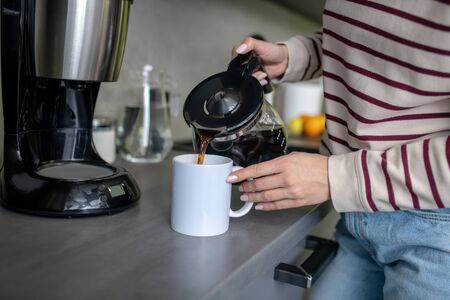Understanding UK Consumer Rights
Let’s take a brisk stroll down the British high street of consumer law, where second-hand treasures often come with their own set of quirks and questions. When you’re eyeing that pre-loved espresso machine in a local charity shop or scrolling through listings on Gumtree, it pays to know what rights you actually have as a buyer in the UK. The Consumer Rights Act 2015 is your guiding lamp here—it covers both new and used goods, ensuring they’re “as described,” “of satisfactory quality,” and “fit for purpose.” But unlike buying fresh from John Lewis or Argos, second-hand goods do acknowledge their age and history; a little wear and tear is expected. However, even if you’re picking up a vintage Gaggia from a market stall in Manchester, if the machine doesn’t work as advertised or has hidden faults not declared by the seller, you’re entitled to seek redress. Whether you buy from a business or a private individual affects your level of protection: shops and online retailers must adhere strictly to consumer laws, while private sellers are only obliged not to misrepresent what they’re selling. So, before you part with your pounds, remember—knowledge of your statutory rights is as essential as knowing how to steam milk just right.
Safety Checks and Mandatory Certifications
Before you even consider taking a second-hand coffee machine home, it’s essential to put on your safety inspector hat—British style. The UK has clear-cut requirements when it comes to electrical safety standards, especially for appliances that have already had a life before yours. The first thing to check is whether the machine has undergone Portable Appliance Testing (PAT). This isn’t just box-ticking bureaucracy; PAT testing ensures that the machine meets basic electrical safety criteria and reduces the risk of fire or electric shock in your flat or café. It’s not uncommon to see a green sticker somewhere discreet on the machine, usually stating the date of the last test and when the next one is due.
If you’re buying from a reputable dealer, they should readily provide paperwork proving PAT testing and any other relevant certifications. If you’re browsing an online marketplace or picking up from someone’s garage, don’t be shy about asking for these documents. Here’s a quick rundown of what to look for:
| Certification/Check | What to Look For | Why It Matters |
|---|---|---|
| PAT Test Certificate | Date-stamped label/sticker & official paperwork | Confirms recent electrical safety check under UK law |
| CE Marking | Sticker or imprint on the appliance body | Shows compliance with EU/UK product standards |
| User Manual/Safety Instructions | Original or reprinted booklet/manual | Essential for safe operation and troubleshooting |
| Seller’s Declaration of Condition | Signed statement of working order and known faults | Adds legal clarity and buyer protection in disputes |
Always double-check plug types as well—UK regulations require a properly fused three-pin plug. If you spot a dodgy adapter or exposed wiring, walk away no matter how charming the seller’s patter. Ultimately, these checks are more than just red tape; they’re your frontline defence against future headaches—and a potentially ruined morning brew.
![]()
3. Where and How to Buy: Trustworthy Sources
In the city’s gentle drizzle or beneath the bright lights of a bustling high street, the search for a second-hand coffee machine begins with a question of trust. Britons, ever pragmatic yet quietly sentimental, know that where you buy is as crucial as what you buy. From the comforting nooks of local charity shops—where treasures sometimes hide among knick-knacks and the money goes to a good cause—to the more commercial but regulated realm of second-hand dealers, each avenue presents its own blend of opportunity and risk.
The Charity Shop Allure
There’s something undeniably British about popping into an Oxfam or British Heart Foundation store, hoping to stumble upon a gently-used espresso maker. Here, staff are usually friendly, and while the machines may come with charming quirks (and sometimes missing instructions), the prices are fair and proceeds support worthy causes. However, seasoned Londoners know to give any potential purchase a thorough inspection; these shops seldom offer warranties, and you’ll be relying on your own eye for safety hazards like frayed cords or dodgy plugs.
Established Second-Hand Dealers
For those who prefer a little more assurance, specialist dealers in used appliances can be found across British cities. These vendors are required by law to ensure that goods are safe and fit for purpose. Look for traders who are members of professional associations or those who provide written guarantees—a sign they take their legal obligations seriously. Even so, urban dwellers will tell you to ask about PAT (Portable Appliance Testing) certificates and request proof of recent servicing before parting with your hard-earned quid.
Online Marketplaces: Convenience vs Caution
The rise of online platforms such as Gumtree, Facebook Marketplace, and eBay has revolutionised how Brits find preloved kitchen kit. The sheer convenience is tempting—just a few clicks from sofa to doorstep—but vigilance is key. Always check seller ratings and read reviews; don’t be shy about asking for detailed photos or evidence that the machine works safely. Be wary of deals that seem too good to be true; counterfeit items and poorly maintained machines occasionally surface amidst the listings.
Pitfalls City Dwellers Know Well
In fast-paced urban life, shortcuts beckon but rarely pay off. Avoid cash-in-hand curbside pickups unless you can plug in the machine and test it yourself; “sold as seen” can mean just that, with no recourse if something goes wrong later on. Remember also that buying from private individuals means you have fewer legal protections compared to transactions with registered businesses. If possible, opt for sellers who issue receipts—helpful not only for warranty claims but also for peace of mind.
A Final Word on British Pragmatism
Ultimately, finding a reliable second-hand coffee machine in Britain is part detective work, part leap of faith, shaped by both legal awareness and lived experience. As any seasoned city dweller will tell you over a flat white at your favourite indie café: weigh up each option carefully, trust your instincts—and never forget to check the plug!
4. Negotiating Warranties and Returns
When it comes to second-hand coffee machines in Britain, the world of warranties and returns is more “best effort” than ironclad promise. Unlike buying brand new from a swish department store, most used machines—whether sourced from a bric-a-brac stall in Camden or a well-established online marketplace—come with limited or no guarantees. So, what can you reasonably expect? And how do you go about ensuring your hard-earned quid isn’t poured down the drain?
Understanding What’s on Offer
Let’s be frank: most private sellers offer sales on an “as seen” basis, which means once you’ve walked away clutching your find, it’s yours for keeps—warts and all. Commercial resellers or shops dealing in used goods may provide a short-term warranty (think 30 to 90 days), but this is far from universal. Here’s a snapshot of what different sellers typically offer:
| Seller Type | Typical Warranty | Returns Policy |
|---|---|---|
| Private Seller (Online/Offline) | None | No returns, sold as seen |
| Second-Hand Shop | Short (1-3 months), if any | Sometimes, within set period |
| Refurbished Appliance Retailer | 3-12 months common | Usually accepted within warranty window |
| Online Marketplace (e.g., eBay UK) | Varies by seller; some buyer protection via platform | Possible if item “not as described” |
The Art of Asking – Brit-Style Tips for Due Diligence
A dash of British politeness goes a long way when clarifying terms. Before sealing the deal, consider these essential questions:
- “Could you tell me if there’s any guarantee left on the machine?” (If so, ask for paperwork.)
- “Is there an option to return it if something goes wrong in the first week or two?” (Phrase gently; sellers appreciate tact.)
- “Has it been serviced recently, or are there any known issues?” (The British tendency towards understatement means you might need to probe gently.)
- “Would it be possible to see it working before I buy?” (A live demo is always wise!)
- If buying online: Check platform policies regarding buyer protection and dispute resolution.
Navigating Rejection Politely
If your request for a return or warranty gets knocked back with a cheery “Sorry, mate, can’t help,” remember that persistence pays off only up to a point. Keep interactions friendly—sometimes goodwill leads to unexpected concessions.
The Bottom Line: Buyer Beware (But Also Be Curious)
Bargain hunting for second-hand coffee kit in Britain is very much “at your own risk.” Yet, being savvy about your rights, asking the right questions, and keeping things civil can help ensure your next flat white isn’t brewed with regret.
5. Post-Purchase Responsibilities
So, you’ve lugged your new (to you) espresso machine home, and the first cup is a triumph—or a tragic letdown. But who shoulders the blame if your second-hand treasure starts spluttering or leaking after the initial excitement fades? The answer, in true British fashion, isn’t always straightforward. Once money changes hands and the kettle’s boiled, ongoing care typically falls squarely on the buyer. Unlike new appliances, second-hand goods rarely come with robust warranties or guarantees unless you’ve negotiated otherwise or bought from a reputable dealer.
If things do go south—say, a pump gives out or an ominous electrical whiff fills the kitchen—the legal landscape tilts towards “buyer beware.” Private sellers have fewer obligations than businesses; they must only ensure that items are ‘as described,’ not necessarily fit for purpose. If you purchased from a business, however, you might still be protected under the Consumer Rights Act 2015, which expects goods to be of satisfactory quality—even if pre-loved.
Now for a slice of English etiquette: post-sale disputes are often handled with a cup of tea and measured civility rather than heated confrontation. If something’s amiss, reach out politely to the seller before escalating matters—most Brits appreciate a composed email over an angry tirade. Should it come to it, small claims court (the local County Court) remains an option for unresolved grievances, but this is generally a last resort in Blighty’s calm, rain-soaked culture of compromise.
6. Local Disposal and Environmental Impact
The journey doesn’t end with the last espresso—the afterlife of your second-hand coffee machine deserves as much thought as its purchase. In Britain, the proper disposal of electrical goods is not just a matter of tidiness but also a legal and environmental responsibility. Under the Waste Electrical and Electronic Equipment (WEEE) Regulations, it’s illegal to simply toss your old bean-to-cup companion into the general rubbish. Councils across the UK provide designated collection points for WEEE items; these are often found at local recycling centres or through special council pick-up services. Many retailers also offer take-back schemes when you buy a new machine, ensuring your ageing appliance is dismantled and recycled in accordance with British standards.
For those living in urban sprawls like London or Manchester, communal recycling points are never too far away—check your local authority’s website for up-to-date details. If you’re after something more sustainable, consider donating machines that still have life left in them to charity shops or community projects, provided they meet safety checks. And for parts beyond repair, avoid fly-tipping at all costs—fines can be hefty and it’s a blight on Britain’s green spaces.
By disposing of your coffee machine responsibly, you’re doing more than clearing counter space: you’re helping to reduce landfill waste, conserve raw materials, and keep Britain’s cityscapes that little bit cleaner. It’s all part of embracing a second-hand culture that’s mindful from first sip to final farewell.

